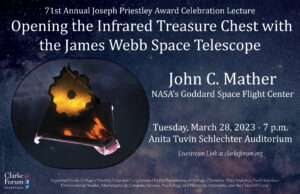Anita Tuvin Schlechter Auditorium – 7 p.m.
Joseph Priestley Award Celebration Lecture
 Opening the Infrared Treasure Chest with the James Webb Space Telescope
Opening the Infrared Treasure Chest with the James Webb Space Telescope
John C. Mather, NASA’s Goddard Space Flight Center
The James Webb Space Telescope, launched in 2021, is NASA’s largest and most powerful space science telescope. Peering back in time, it probes the cosmos to uncover the history of the universe from the Big Bang to alien planet formation and beyond. 100 times more powerful than the celebrated Hubble Space Telescope, Webb can detect the heat signature of a bumblebee at the Earth-Moon distance.
The Joseph Priestley Award recipient is chosen by a different science department each year. The Department of Physics & Astronomy selected this year’s recipient. The event is supported by the Priestley Fund and is sponsored by the Clarke Forum for Contemporary Issues and co-sponsored by the departments of biology, chemistry, data analytics, earth sciences, environmental studies, mathematics & computer science, psychology, and physics & astronomy, and the Churchill Fund. It is part of the Clarke Forum’s Leadership in an Age of Uncertainty Series.
Topic overview written by Natalia Fedorczak ’24.
Biography (provided by the speaker)
 Dr. John C. Mather is a senior astrophysicist and is the senior project scientist for the James Webb Space Telescope (JWST) at NASA’s Goddard Space Flight Center (GSFC). Since the project started in 1995, he has led the JWST science teams. As a postdoctoral fellow at NASA’s Goddard Institute for Space Studies, he led the proposal efforts for the Cosmic Background Explorer (COBE) (’74-’76), and went to GSFC to serve as the study scientist (’76-’88), project scientist (’88-’98), and the principal investigator for the Far IR Absolute Spectrophotometer (FIRAS) on COBE. With the COBE team, he showed that the cosmic microwave background radiation has a blackbody spectrum within 50 parts per million, confirming the expanding universe model to extraordinary accuracy. The COBE team also made the first map of the hot and cold spots in the background radiation (anisotropy). Mather received the Nobel Prize in Physics (2006) with George Smoot, for the COBE work.
Dr. John C. Mather is a senior astrophysicist and is the senior project scientist for the James Webb Space Telescope (JWST) at NASA’s Goddard Space Flight Center (GSFC). Since the project started in 1995, he has led the JWST science teams. As a postdoctoral fellow at NASA’s Goddard Institute for Space Studies, he led the proposal efforts for the Cosmic Background Explorer (COBE) (’74-’76), and went to GSFC to serve as the study scientist (’76-’88), project scientist (’88-’98), and the principal investigator for the Far IR Absolute Spectrophotometer (FIRAS) on COBE. With the COBE team, he showed that the cosmic microwave background radiation has a blackbody spectrum within 50 parts per million, confirming the expanding universe model to extraordinary accuracy. The COBE team also made the first map of the hot and cold spots in the background radiation (anisotropy). Mather received the Nobel Prize in Physics (2006) with George Smoot, for the COBE work.
Joseph Priestley Lecture
The Joseph Priestley Award is presented by Dickinson College in memory of Joseph Priestley, discoverer of oxygen, to a distinguished scientist whose work has contributed to the welfare of humanity. The award, first presented in 1952, recognizes outstanding achievement and contribution to our understanding of science and the world.
